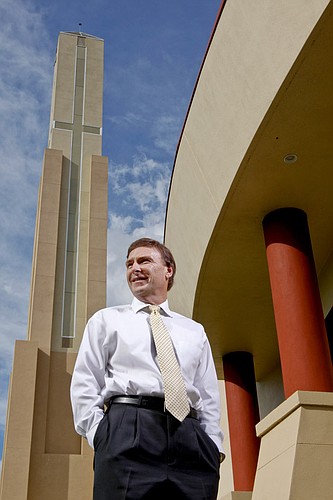- July 26, 2024
-
-
Loading

Loading

The experience can be downright religious when Sarasota architect Don Lawson, who doubles as the chairman of a $344 million community bank, works with a church on obtaining construction financing.
Take the Church of Hope in Sarasota. Lawson, principal and founder of Lawson Group Architects, talked to the church's pastors about their hopes and ideas for a $40 million renovation and expansion project long before they were ready to launch it. Lawson counseled the pastors about budgets, collateral and the intricacies of securing financing in an economic downturn.
“He guided us through all the complicated steps necessary for an expansion project as large as ours,” says Peter Young, the church's senior pastor. “It takes much of the worry out of our minds.”
Lawson and has staff have duplicated that kind of work for more than 200 churches over the past decade, both on the Gulf Coast and across the Southeast.
The work has become a cornerstone of the 26-year-old firm, representing as much as 40% of the firm's total project portfolio in some years.
“A lot of people in churches have good ideas, but they don't understand too much about financing,” Lawson says. “We certainly know what the banks are looking for.”
Church projects have also played a key role in the company's recession survival strategy. In fact, by at least one financial measure — total dollar value of construction projects it worked on — 2008 was the company's best year ever and 2009 will be down no more than 20%, says Lawson, a victory these days for many construction-industry related firms.
In 2008, the Lawson Group tallied $500 million in the total value of projects it worked on. This year that number could dip as low as $400 million, but Lawson projects it will be back up to the $500 million range by next year. In fact, the past 60 days have been so busy that Lawson says he's behind on getting contracts out to clients for potential work in 2010.
Lawson founded the architecture, planning and design firm in 1983, getting work at first by literally knocking on doors around Sarasota. The firm has since grown to the point where over the last decade it has had a role in most of the major construction projects in the Sarasota-Bradenton area.
And despite success stories such as the one with the Church of Hope, Lawson doesn't want to be known only as the church guy. After all, his firm worked on dozens of projects in 2008 that didn't involve churches.
Nonetheless, the Lawson Group has 15 to 20 church projects going simultaneously each month, a high number for a firm with 18 employees. There's also the column Lawson writes occasionally for trade publications such as Worship Facilities.
Lawson says the firm's church portfolio has grown so much partially because many other architects will stay away from the work due to the complexities of the projects.
For example, Lawson says by nature of their structure, religious organizations have a lot of people in opinion roles that can cloud decision-making. “It takes a lot more listening skills” to work on a church project, says Lawson.
In one recent column titled “Make Your Banker's Jaw Drop,” Lawson, chairman and co-founder of Sarasota-based Bank of Commerce, gives away some of the secrets church leaders need to know for getting a loan.
He suggests they prepare a three-ring binder with reams of data, from the church's IRS tax-exempt code to the board resolution supporting the expansion.
Lawson also suggests that church leaders set up a competition among banks for the loan business.
“Instead of being a supplicant, you've told the bank they must compete for your business,” Lawson wrote. “In our bank, if we know we're competing for your business, we're very cautious, of course, but we've been known to drop the interest rate as much as 25 basis points and to reduce or eliminate loan fees.”
Finally, when it comes to work with churches, Lawson does take one approach slightly counterproductive to his own business. He will turn away jobs if he thinks a church is being too aggressive.
“There are some churches not in a position to take on debt,” says Lawson. “And we'll tell them that.”